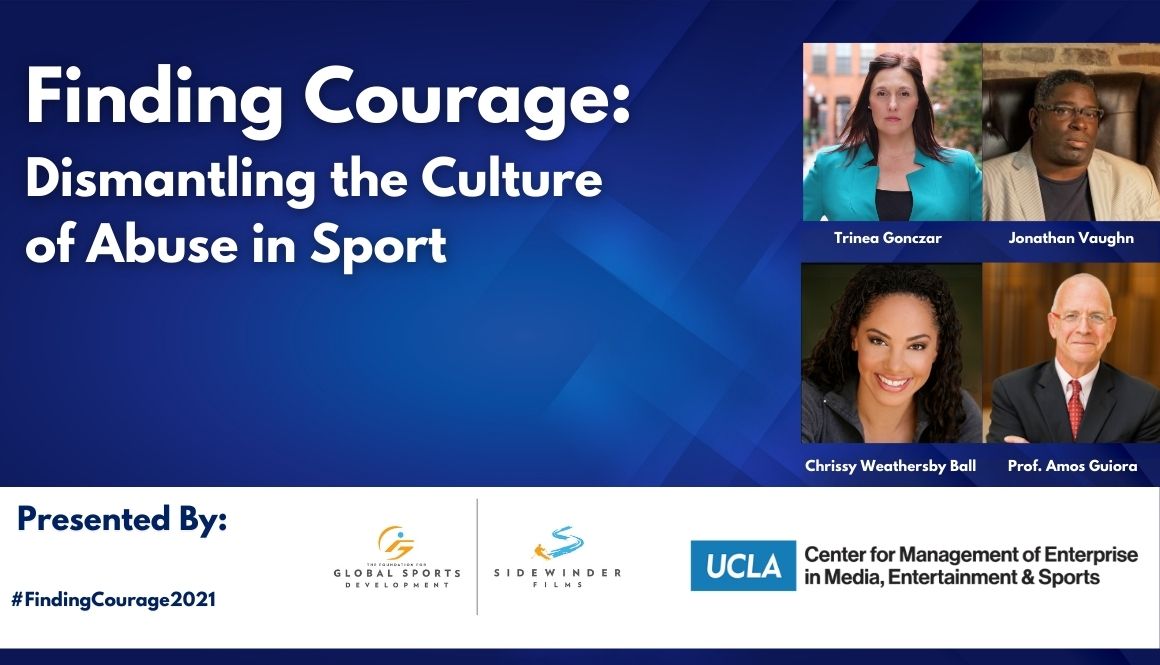We recently partnered with the UCLA Anderson Center for Management of Enterprise in Media, Entertainment & Sports to present a webinar titled “Finding Courage: Dismantling the Culture of Abuse in Sport.” This event took place on April 1, 2021 and kicked off Youth Sports Safety Month and Sexual Assault Awareness Month. We focused on an important topic: protecting young athletes. Attendees viewed our award-winning documentary At the Heart of Gold: Inside the USA Gymnastics Scandal prior to the event.
Visit our Courage First page to learn more about this program.
Guest speakers include:
- Moderator – Daphne Young, Chief Communications Officer at Childhelp
- Trinea Gonczar – Sister Survivor, Director of Development at Avalon Healing Center, recipient of our 2018 Humanitarian Award, featured in At the Heart of Gold: Inside the USA Gymnastics Scandal
- Jonathan Vaughn – Activist, survivor, and former NFL player
- Chrissy Weathersby Ball – Sister Survivor and board member for the National College Players Association
- Professor Amos Guiora – Law professor at the S.J. Quinney College of Law at the University of Utah and author of “Armies of Enablers: Survivor Stories of Complicity and Betrayal in Sexual Assaults.”
Extended Q&A
A few questions were submitted during our Finding Courage: Dismantling the Culture of Abuse event that, due to time constraints, we were not able to answer. We reached out to panelists Jonathan Vaughn and Professor Amos Guiora to answer the questions post-event.
- So interested in how to balance power so there is no fear – where no athlete (or administrator) will feel too afraid to stand up to maltreatment – how do we balance power so that an abuser does not have unmonitored access?
- Jonathan Vaughn: I think we need outside independent policing and policies in place for better checks and balances. Stop the status quo of doing things the same way as have been done in the past.
- Professor Amos Guiora: This is a most important question with no clear answer; one of the most important shifts in sports culture (and any institutional culture) is the institutionalization of responsibility, accountability, and transparency. This will not happen overnight given the powerful vested interests that protect the institution and its leadership. As I mentioned in my comments, I am believer in legislation/criminalizing and believe that criminalizing the enabler who protects the institution is the next logical step after criminalizing the bystander. The fear of speaking up will be minimized (not eradicated) if leadership is held accountable, including possible loss of job and other penalties.
- I am a former high performance athlete who has transitioned to the coaching space. What are things I can do as a coach to support my athletes, especially if I have seen abuse (grooming, gaslighting) occurring and I as a coach am being silenced from speaking up against it?
- Jonathan Vaughn: First, believe the your athletes when they come to you. Second, make sure all the protocols are met when reporting incidences and lastly, don’t be afraid to go above someone’s head to get your complaint taken seriously. The squeaky wheel gets the oil.
- Professor Amos Guiora: Given that your number one duty/obligation is to the athlete whose care has been entrusted to you the challenge—admittedly difficult—is developing a strategy to confront those who endanger the athlete. There are different ways to do so, including (but not limited to): removing the athlete from the “danger zone” (not the ideal); reporting the abuse to law enforcement; reporting the abuse to the relevant sports organization; consulting with the athlete’s family (depending on the age) to see what course of action they prefer. Depending on the athlete’s age, talking with him/her is also a possibility but would suggest doing so in consultation with the family. While it is difficult to be a “snitch” (whistleblower in correct parlance), such a situation—-frankly—–demands that of you…..otherwise you will be the enabler which I am sure is furthest thing you wish to be.
- Why isn’t there more criminal prosecution of these coaches/enablers?
- Jonathan Vaughn: I think a lot of it has to do with the laxed governance by the NCAA in holding the entire program accountable for violations. Until the NCAA steps up and does the right thing it will be harder and harder to take the criminal route to prosecution.
- Professor Amos Guiora: (Prof. Guiora discussed this topic during the panel, and we asked him to provide links to resources with more information. They are below)
- How do we reframe the idea that strength in sport is about enduring violence?
- Jonathan Vaughn: Wow, great question. This is the X factor for sure. We need to completely change our perception of what real strength is and how it is exhibited.
- Professor Amos Guiora: That strikes me as one of the most important questions re the existing sports culture. The expressions, “no pain, no gain,” “be tough,” “shake it off,” have been heard by anyone who has played sports. It is an inherent-intrinsic part of sports as pain (and pain management) are built-in components. Anyone who steps on the field is competitive (you should see me 5:30 am in Pilates) and doesn’t want to lose…..most of us don’t believe in a trophy for 8th place and probably (on some level) agree with Vince Lombardi, “winning is the only thing.” THAT SAID, given CTE research (as an example), it is clear that “win at all costs” is not cost free and the long term harm can be very severe/tragic (see this as but an example, https://www.espn.com/nfl/story/_/id/31214902/report-former-nfl-player-phillip-adams-kills-5-himself) and in same vein see the environment that was tolerated at LSU where winning took precedence over all other considerations, https://www.espn.com/college-football/story/_/id/31217379/lsu-official-sues-50-million-alleging-retaliation-les-miles-allegations Ask yourself, as did Mattie Larson (USA Gymnastics), “how the f*** did they (USAG officials) allow a 14 year old girl to go alone to a man’s hotel room at night” (referencing Larry Nassar). Obviously no easy-clear answers but deserving of broader conversation with one HUGE caveat: the role of $$ and what that means Universities are willing to tolerate (ask yourself how long did it take Indiana U to shove Bobby Knight out the door???)
Resources
- Learn more about At the Heart of Gold and our abuse prevention initiative Courage First at www.couragefirst.org.
- Take the Stewards of Children® training from Darkness to Light through our free access portal.
- Need support? Contact Childhelp – for children and adults of all ages – at (800) 422-4453 or at www.childhelphotline.org.
- Go beyond the film with our At the Heart of Gold discussion guide, available at: https://couragefirst.org/film-discussion-guide
- Interested in hosting a screening? Contact us! https://couragefirst.org/host-a-screening
Watch the recording of Finding Courage: Dismantling the Culture of Abuse in Sport below.



